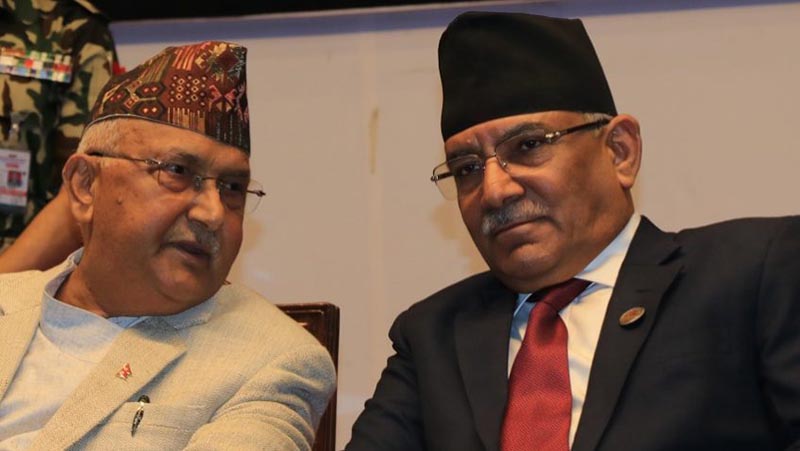NCP yet to publish political document
Kathmandu, June 21
Amid criticism and pressure from its leaders and cadres, the two co-chairs of the Nepal Communist Party (NCP), Prime Minister KP Sharma Oli and Pushpa Kamal Dahal, have finally called the central secretariat’s meeting tomorrow to discuss and finalise the party’s political document and fill all the vacant posts.
Members of the NCP, which was formed in May following merger of erstwhile CPN-UML and CPN-Maoist Centre, have long been criticising the leadership for not making the political document public. This delay has kept the party’s members in dark about the party’s ideology, according to Surendra Pandey, a standing committee member.
The party’s political document was drafted by a nine-member committee led by former PM and party’s senior leader Madhav Kumar Nepal. The committee had unanimously endorsed the document and handed it over to the two co-chairs.
“The political document has also been endorsed by the party’s standing committee. But I don’t know why it has not been published,” said Ghana Shyam Bhusal, a member of NCP’s standing committee.
The two co-chairs kept the document under wraps following dispute between senior leaders over the party’s ideological line, according to an NCP central secretariat member.
The members of the erstwhile CPN-UML, for example, have been pitching for ‘people’s multi-party democracy’, whereas former Maoist Centre members have said the party should embrace ‘21st-century people’s democracy’.
On May 17, Deputy Prime Minister Ishwor Pokharel, a close aide of PM Oli, publicly said the NCP must accept key ideological line of ‘people’s multi-party democracy’. Later, Dahal objected to Pokharel’s statement and said the merger between two parties would never have taken place had they taken a stance on ideological issues. These statements had exposed ideological differences among senior NCP leaders.
“The political document that we passed doesn’t speak of people’s multi-party democracy or 21st-century people’s democracy. There is a middle way,” said Pandey, without elaborating. “We hope the party will get a clear ideological line after the first general convention is over.”
This lack of clarity on party’s ideology and delay in making the political document public have prompted many NCP members to say that the party’s merger has failed to merge hearts and minds of cadres who come from different backgrounds.
When the two parties started their consolidation process, the two co-chairs had said the entire unification process would be completed within three months. But even after a year of their merger, district in-charge and co-in-charge have not been appointed, politburo members have not been nominated and NCP’s departments have not started functioning.
“This delay has courted criticism from within the party. And PM Oli has also realised that it is high time responsibilities were shared among members so that the party can function properly,” a senior NCP leader said on condition of anonymity, adding, “These issues will most probably be finalised by tomorrow’s meeting.”






